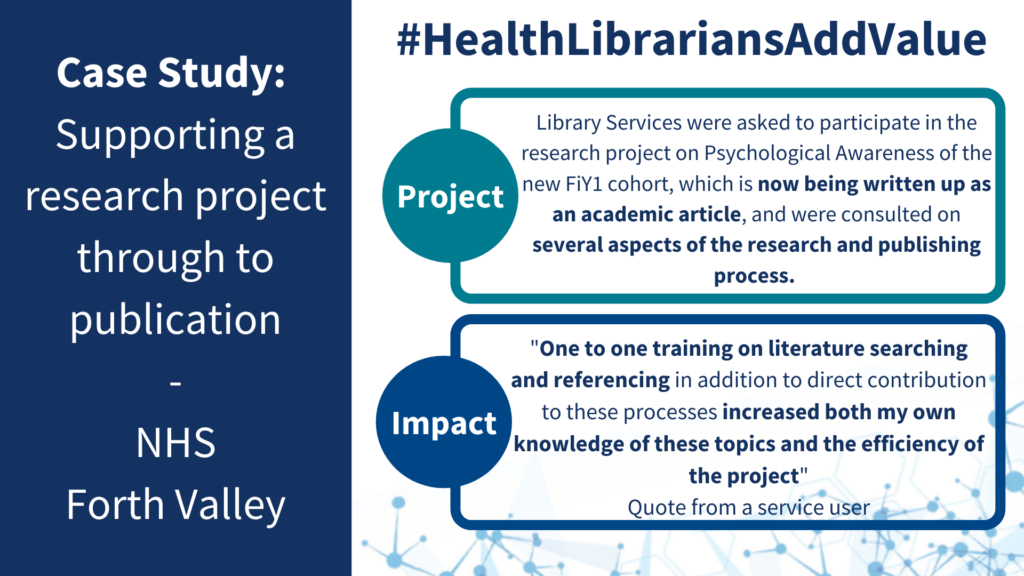Supporting a research project through to publication
This case study is part of Health Librarians Add Value, a campaign run jointly by NHS Education for Scotland (NES) and CILIPS. It has been provided by Rose Clark, Librarian at Forth Valley Royal Hospital. Read other case studies here.
Outline of the project
A team at Forth Valley, which included the Clinical Teaching and Simulation Fellows, conducted a project looking at the Psychological Awareness of the new FiY1 cohort. The Library Services were asked to participate in the project, which is now being written up as an academic article, and were consulted on several aspects of the research and publishing process. This project has allowed the team to see how the Library Services resources and skills can be applied to projects and different aspects of their work.
The project can be broken down into four areas:
- Planning
This involved the undertaking of searches to ensure there were no similar articles already completed and to find sources on the wider topic. Training was also given to participants so they could conduct their own searches for future projects. There were also localised processes that needed to be followed and as such, the Research and Development team were contacted to discuss the project and ethical approval. It was decided that this particular project was a Quality Improvement project and it was added to the QI register of projects. At this stage, the library also provided useful guidance and resources for the undertaking of the research, including textbooks and sources referring to their method of researching which on this occasion was Qualitative.
- Journal Selection
The researchers were talked through their options with regards to journals, including information on impact factors, open access, and NHS Scotland subscriptions. This was also an opportunity to promote the resources on The Knowledge Network and the TURAS Learn module on ‘Getting Published’. At this stage the researchers were also encouraged to ‘get to know’ their journal of choice, reading previously published articles, finding the criteria and formatting information, and checking if there were any requisites that had to be sent in prior to submission.
- Write up
A discussion was had about article type and the importance of writing an article for a specific journal to their criteria. At this stage, the researchers were asked to check the desired referencing style and formatting so that the referencing process could be integrated into the write up in order to save time at the end. Training was given on Refworks and how this area of the Library Services could be beneficial to all projects not just official “Write Ups”.
- Outcomes
This project highlighted the resources and services on offer through the Library Services which can help clinical members of staff, particularly new graduates, who are just starting to think about getting their research published. It also allowed the Library to look at how they could better support these staff members with relevant skills and training that would be valuable for the research and publishing process.
Specifically for Forth Valley, it allowed for more joined-up thinking within the organisation and helped to connect the Library to other departments and support their services including Research and Development and Quality Improvement. This more inclusive way of working should benefit all departments and services in the longer term.
Impact
Library staff input to this project has been highly valued. Robyn Anderson, Clinical Teaching Fellow at Forth Valley Royal Hospital sad:
Rosie has been an invaluable team member in the completion of our qualitative research project. One to one training on literature searching and referencing in addition to direct contribution to these processes increased both my own knowledge of these topics and the efficiency of the project. Rosie suggested research/publishing considerations (such as open access rules and the need to register QI projects) that never would have occurred me without her input. Her advice made the process of navigating R&D and ethics approvals painless and help with journal selection has given us direction and confidence that the article will be published.
A library staff member said:
This project was influential in helping to establish the Library Services within the organisation as a whole and in making beneficial connections with other departments. It also allowed for promotion of the Library resources and knowledge in a meaningful away.
